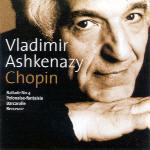Vladimir Ashkenazy’s 1999 recital devoted to late Chopin works may cover familiar stomping ground for this pianist, yet it’s hardly a case of “same old same old”. For example, the fire and scintillation characterizing the pianist’s 1964 Fourth Ballade are replaced by steadier basic tempos and heightened polyphonic awareness, notably in the coda. I also notice subtler coloring and more forward moving impetus in the Op. 62 Nocturnes, although Ashkenazy’s trills in the B major piece remain as consistently ravishing as ever. Compared to his recordings from two decades ago, Ashkenazy downsizes his apt rubatos and pungent accents in the Op. 59 Mazurkas (among Chopin’s most inspired works in this genre), and binds the Polonaise-Fantasie’s discursive elements to more flowing effect. But the Barcarolle still seems as deficient in tenderness and lyric drama as Ashkenazy’s two earlier Decca versions, and I continue to prefer the warmer-toned generosity of his youthful 1958 EMI recording (reissued on Testament).
Ashkenazy’s previous Berceuse featured a more insistent “passacaglia” left hand pattern that managed to support rather than straightjacket the right hand filigree. It puts this relatively flaccid and static remake in the shade. You’ll have to look far and wide, though, to hear a “Minute” Waltz so perfectly poised and thoughtfully detailed; ditto for the other two waltzes comprising Op. 64. Beyond question, the warm, ample engineering does far greater justice to Ashkenazy’s sonority than the tubby and metallic sonics we often hear in the pianist’s 1970 Decca recordings.
































